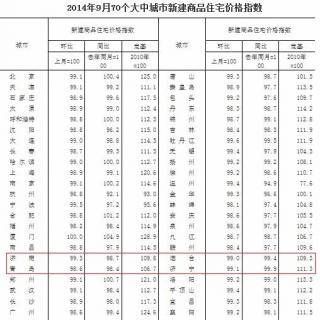
介绍:
China Sept. home prices continue to moderate
Home prices continued to ease in most Chinese cities last month.
The National Bureau of Statistics is reporting new home prices in 69 of 70 major cities monitored are reporting month-on-month drops.
The only exception is the city of Xiamen, where home prices remained flat from the previous month.
Second home prices in all the same cities registered a monthly decline as well.
Senior NBS statistician Liu Jianwei says that though property prices remained in a year-on-year slump, the prices fell at a slower pace.
Zhao Xijun is the head of the Finance and Economics School at Renmin University of China.
"These minor policy changes still fall in line with the government's general purpose of adjustment in the property market. That is to limit demands of investments and speculations."
At the end of last month, China's central bank released a policy change, treating second-time home buyers the same as first-timers.
That includes discounts on mortgage rates and lower down payments.
Earlier this year, most cities in China relaxed limits on home purchases that only allow people to buy no more than two homes.
China unemployment rate steady
China's urban unemployment rate has been steady through the first nine months of this year, despite the cooling economy.
Data from the Ministry of Human Resources and Social Security show the urban registered jobless rate stood at around 4 percent.
The labour authority also says almost 11 million new jobs were created from January to September, slightly up from that of last year.
But it is warned that the actual unemployment numbers might be higher.
The Chinese government aims to keep its registered urban jobless rate below 4.6 this year, unchanged from the target for last year.
Tianjing may be the next free trade zone
Tianjin, the municipality neighboring Beijing, may be the next free trade zone in China after Shanghai.
Tianjin has reportedly submitted an application to the State Council, waiting for the last step of its approvals.
People within the city government of Tianjin reveal that the new free trade zone will have two tariff-free areas and one commercial area.
It is also revealed that the new FTZ will be twice as large as that in Shanghai.
Companies within the zone can enjoy preferential policies like tax exemption that are not applied in other parts of China.
RMB becomes 2nd most-used currency for cross-border payment in China
China's yuan has become the second most-used cross-border payment currency in the country.
The People's Bank of China has announced that the cross-border yuan settlement stood at around 5 trillion yuan, or 780 billion U.S. dollars, at the end of last month.
That is up more than a hundredfold from 5 year ago, when the service was initiated.
Hu Xiaolian is the vice governor of China's central bank.
"The number of countries that have cross-border yuan payment service has reached 174. The service helps businesses in those countries to avoid currency exchange risks and reduce their financial costs. Banks can also provide more financial products and services for enterprises to conduct cross-border investment or transactions. Therefore, both enterprises and banks benefit from cross-border yuan services."
The vice governor adds the development of the cross-border yuan payment service has pushed forward the currency's internationalization.
International financial service provider SWIFT says the yuan has become the world's seventh most-used currency for payment and the second most-used currency for trade financing.
Weekly corporate roundup
Anchor:
Now Let's check out some key events on the corporate front in China this week.
Here is CRI's Paul James talking to Doug Young, associate professor at Fudan University and former China company news chief at Reuters.
…
Back anchor: That's Doug Young, associate professor at Fudan University and former China company news chief at Reuters, talking to CRI's Paul James.
Microsoft sales beat expectations
Microsoft has reported higher-than-expected quarterly revenue, helped by stronger sales of its phones, Surface tablets and cloud computing products.
Its revenue for the first fiscal quarter grew 25 percent compared to that of last year.
Sales of its Lumia smartphone hit 9 million units after it bought the phone business from Nokia in April.
Sales of the Surface tablet doubled from the year-ago quarter.
The company also says cloud sales rose nearly 130 percent, while sales of services based on its Azure cloud platform was up 120 percent during the first fiscal quarter.
But its profit through the quarter fell 13 percent, due to mass layoffs announced in July.
The decision of cutting 14 percent of its workforce charged Microsoft more than 1 billion dollars.
大家还在听

